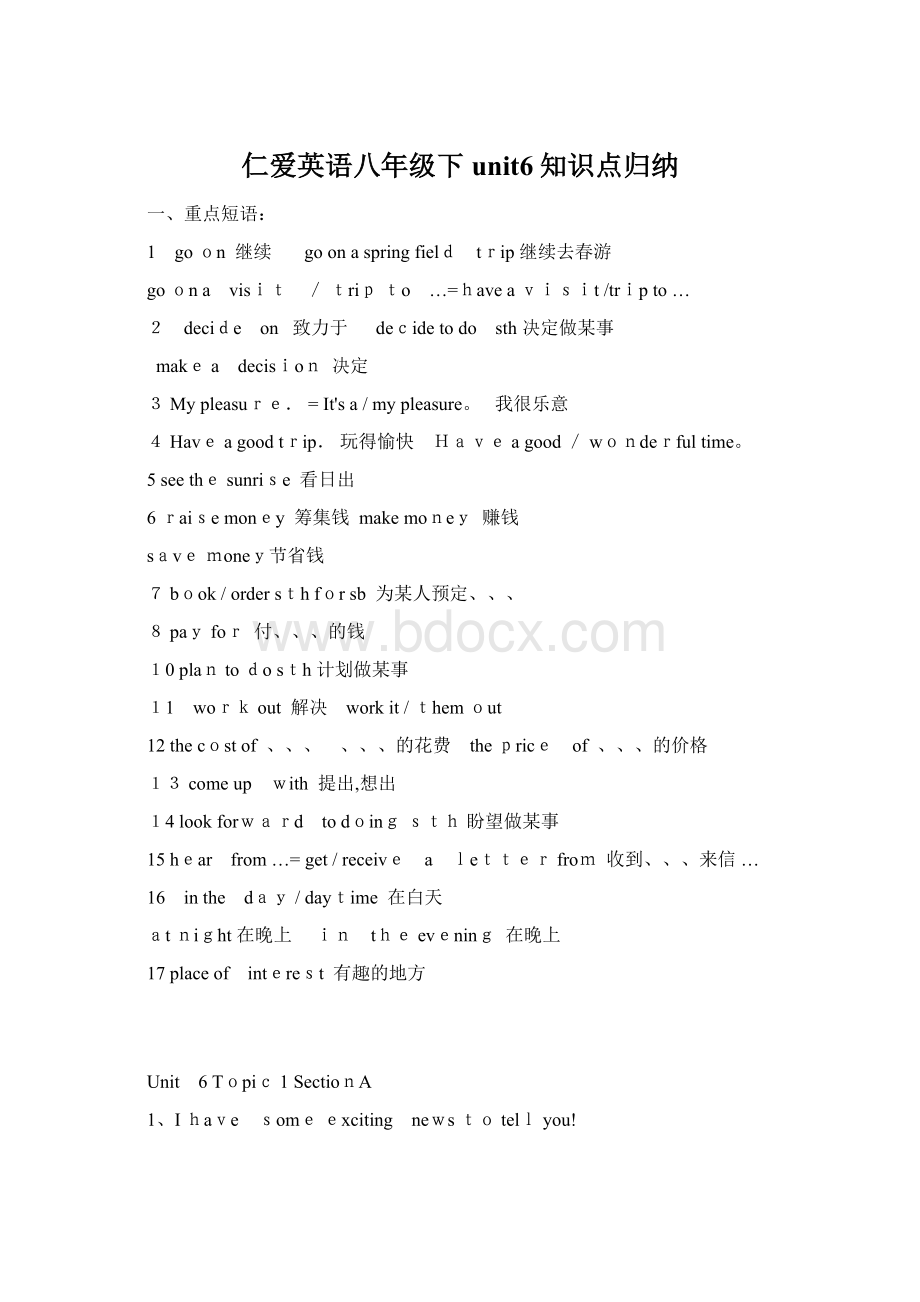仁爱英语八年级下unit6知识点归纳.docx
《仁爱英语八年级下unit6知识点归纳.docx》由会员分享,可在线阅读,更多相关《仁爱英语八年级下unit6知识点归纳.docx(21页珍藏版)》请在冰豆网上搜索。

仁爱英语八年级下unit6知识点归纳
一、重点短语:
1 goon 继续 goonaspringfield trip 继续去春游
goona visit /tripto …=haveavisit/tripto…
2 decide on 致力于 decidetodo sth 决定做某事
makea decision 决定
3Mypleasure.=It'sa/mypleasure。
我很乐意
4Haveagoodtrip. 玩得愉快 Haveagood/wonderfultime。
5seethesunrise 看日出
6raisemoney 筹集钱 makemoney 赚钱
savemoney节省钱
7book/ordersthforsb 为某人预定、、、
8payfor 付、、、的钱
10plantodosth 计划做某事
11 workout 解决 workit/themout
12thecostof 、、、 、、、的花费 theprice of 、、、的价格
13comeup with 提出,想出
14lookforward todoingsth 盼望做某事
15hear from…=get/receive a letterfrom 收到、、、来信 …
16 in the day/daytime 在白天
atnight 在晚上 in theevening 在晚上
17placeof interest 有趣的地方
Unit 6Topic1SectionA
1、Ihave someexciting newstotellyou!
totellyou 是动词不定式作后置定语,修饰名词news。
和news间是动宾关系。
如果该动词是vi,则不要漏掉后面的尾巴-介词。
如:
Ihave nothingtotalkabout。
① goonavisitto“去…。
参观/旅行”
类似的搭配:
goon atrip 去旅行 goonapicnic 去野餐
② a three-dayvisitto Mount Tai “去泰山三日游”
three—day 是个复合形容词,由“基数词+连字符+名词单数”形式构成。
可位于名词前作定语。
如:
a13—year-oldboy 一个13岁的男孩
an18—kilometerriver 一条18公里长的河
3、Let’sfindoutsomeinformation aboutthe cost.
①findout “查明,发现,弄清(情况)”
【辨析】findout,find,lookfor
∙findout 多指调查询问,研究后“搞清楚,弄明白”
∙find 强调找的结果
如:
Ican’tfindmyshoes。
∙lookfor 指寻找,强调动作
如:
I'mlooking formywallet.
4、Bringyourinformation tomorrow andwe'll decide onthebesttravelonyourfieldtrip。
①decideon/upon 决定,选定
decide todosth“决定做某事”=makeadecisiontodosth
否定形式:
decide nottodo sth 决定(不)做某事
②thebestwaytodo……“做…。
的做好方式”
这里的todo 作定语修饰the way
如:
Thebestwaytoraise moneyisto sellnewspapers。
Unit6Topic1 SectionB
5、Kangkangisbookingtraintickets toMount Tai。
此处book为动词,“订票,预约”
bookaroomforsb/sth=orderaroom forsb/sth
6、MayI haveyour nameandtelephonenumber,please?
May Ihave….“可以…吗?
”是一种委婉表达请求的交际用语。
如:
MayI haveabook,please?
可以给我拿本书吗?
7、A standardroomwithtwosingle bedscosts¥100and aroomwithone singlebedcosts¥80。
withtwosinglebeds 中的with“带有”反义词是without
Unit6 Topic1Section C
8、It’s very commontoraisemoney inCanadianandAmericanschools.
①raise 是及物动词“筹集”,还表“举起;使升高”,一般指把某物从低处抬高到高处。
如:
Sheraisedher hand。
她举起了她的手.
rise 是不及物动词“升起,上涨”,一般指事物本身由低处移到高处。
如:
Thesun rises intheeast。
太远从东方升起。
② common“常见的;共同的"
9、Itcostseachstudentonedollartobuyaticket forthe draw.
1)spend/cost/pay/take表示“花费”的用法
1).人+spend/spent+时间/金钱+ onsth。
某人在某事上花时间/金钱.
人+spend/spent +时间/金钱+(in)doingsth。
某人花时间/金钱做某事。
Ispent2hours (in)seeinga movie
=
2).人+pay/paid+金钱+for+sth。
某人为某东西花钱.
人+pay/paid for+sth。
某人为某东西付款。
3).物/事+costsb.+金钱 什么东西花了我多少钱。
4)It takes/tooksb。
+时间+todosth。
做什么事情花了某人多长时间.
我花了380元买了一张去北京的火车票。
Ø∙∙①。
(pay) ___ Ipaid¥380 for atrainticket toBeijing.
Ø∙∙②。
(cost)___ Itcostme ¥380tobuy atrainticket toBeijing.
Ø∙∙③.(spend) ___Ispent ¥380buying/on atrain ticket toBeijing.
10、I'mlooking forwardtohearing from you。
1)look forwardto “期待,盼望”
常见搭配:
lookforwardtosth/doingsth 常用于现在进行时中。
2)hear from“收到….的来信"
如:
Heheardfromhisfriend yesterday。
=Hegotaletterfromhisfriendyesterday。
Unit6Topic1 Section D
11、On thethirddayofour trip,weclimbedMountFuji.
Onthethirddayof…。
在具体某一天用介词on
如:
on themorningof March10th 在三月十日的上午
on acoldevening 在一个寒冷的晚上
12、I was soexcited thatIdidn’tfeelcoldatall。
so+adj/ adv+that从句“如此…。
以至于…"
三、重点语法——动词不定式
1、 不定式的肯定形式由“to+动词原形"构成.
否定形式“notto+动词原形”。
2、 to只是不定式的一个符号,没有任何实际意义.
3、 不定式可以作除谓语以外的其他句子成分,如主语,宾语,表语,定语,状语,宾补。
1)作主语, 常用it(形式主语)代替, 不定式放在后面做真正主语.
Itishardtosay. 很难说。
ItisimportanttolearnEnglishwell. 学好英语非常重要。
注:
①如果要说明动词不定式的动作是谁做的,可在不定式前加一个forsb作它的逻辑主语。
如:
It’sdifficultforustofinishthework.
②如果表语是kind,nice,right,wrong,good,clever等表人的性格,品质等形容词,则加of。
如:
It’sverykindofyou tohelpme.=Youarekind tohelpme.
2)作表语, 常用在系动词之后.
Yourgroup’staskistofind out thecostto goby train。
你小组的任务是去弄清搭火车的费用。
Sheseemsto behappy。
她似乎很快乐。
4)作宾语, 常用在want;like;hope;begin;try; forget; learn; plan;decide; need 等及物动词后,构成动宾结构。
如:
Iwant tobuysome books. 我想去买一些书.
Shelikesto join theEnglishClub. 她喜欢加入英语俱乐部。
提示:
跟动词不定式作宾语的动词有:
Ø∙∙ 想预订房间wantto bookaroom
Ø∙∙ 决定去春游decidetogoonaspringfieldtrip
Ø∙∙ 计划骑车去那儿 planto cyclethere
Ø∙∙ 选择乘火车choosetotakeatrain
Ø∙∙ 希望玩得愉快 hopeto haveagoodtime
Ø∙∙ 拒绝与别人说话 refuse totalk with others
5)作宾补,①跟动词不定式作宾补的动词:
v。
+sb.(not) to do sth.
告诉tell 鼓励 encourage
命令order 使 get
想要want/wouldlike 邀请 invite
教teach 要求 ask
②跟动词不定式作宾补的动词( v。
+ sb。
(not) dosth。
)-—to省略
“听、观、使、让、帮”-——- hear, see,watch, make,let,help
但是help也可用helpsb.todosth. 的结构
如:
我看见他几乎每天都打篮球。
Iseehim playbasketballalmostevery day。
老板强迫工人整天干活。
The bossmakes theworkers workallday。
6)作定语,常用在被修饰的名词/代词之后。
Ihave someexciting news to tellyou。
我有一些令人激动的消息告诉你。
Hewantstofind achair tosit on. 他想找把椅子坐。
下列动词常接动词不定式作定语:
chance,time,wish, way,thefirst,theonly, the second,the last,promise等。
如:
Hehasnotimeto see thefilm.
7) 动词不定式作目的状语:
① 我要去北京看长城。
I wanttogo toBeijingtovisit theGreat Wall.
② 为了赶上早班车,他每天很早起床。
Hegetsupearlyto catchtheearlybuseveryday。
③ 他们决定上网以获取更多的信息.
Theydecided tosearchtheInternettogetmoreinformation.
Topic2 How aboutexploringTian’anmenSquare
一、重点词组
1speakto 对某人说话
2bebusydoingsth 忙着做某事
3rideone’s bicycleto=cycleto 骑自行车去、、、
4wouldlikesb to dosth=wantsbto dosth 想要做某事
5twoandahalfhours =twohoursanda half 两个半小时
6in the …of 在、、、里 onthe …of 在、、边上 tothe…of相隔
7besurprisedatsth 对某事吃惊 be surprisedto dosth
to one'ssurprise
8in differentdirections在不同的方向 in alldirections 在所有方向
9steponone's feet
10 rushout of 冲出
11 rideto 骑自行车去
12 be famousfor 因、、而出名 befamousas 作为、、出名
13can’t/couldn't helpdoing 禁不住做某事
14hereand there=every where 到处
15 thankgoodness 谢天谢地
16havefundoing sth 做某事很有趣;
Unit 6 Topic 2 SectionA
1、 While youwereenjoyingyourtrip,Iwasbusy preparingfor my exams.
你在愉快地游玩的时候,我正忙着准备考试.
(1)、while在此引导时间状语从句,表示持续性的动作或状态,只与延续性动词连用,侧重表示主句和从句动作同时发生,有对比的意味,常用现在进行时或过去进行时。
如:
Iwas doingmyhomeworkwhilemom wascooking.
妈妈做饭时,我在做作业。
(2)、bebusy doing sth“忙于做某事”
如:
现在我正忙着做饭。
______________________________________
(3)、prepare for (doing)sth“准备(做)某事”
考题链接:
① Theboys arebusy ____________ (prepare)for theirfootballmatch。
② —-Whatwereyou andyoursisterdoingatthis timeyesterday,Lily?
—I wasdoingmy homework_________she waswatchingTV.
A.A。
when B.while C。
after D.before
Unit6 Topic2SectionB
2、 It’s880meters longfromnorthtosouth and500meters widefromeasttowest.
它南北长880米,东西宽500米。
基数词+长度单位+long/wide/high/deep“多少(米)长/宽/高/深”如:
The desk isabout1。
2 meters long。
这张课桌大约有1。
2米长.
试比较以下两句话:
① Theboyis10yearsold。
这个男孩10岁
② Heisa10—year—old boy。
这是个10岁的男孩.
3、--HowfarisitfromheretoTian’anmenSquare?
—-It's aboutone andahalfhoursbybike.
——从这儿到天安门广场有多远?
--骑自行车大约一个半小时。
(1)、Howfar多远 →提问两地之间的距离。
how long → 对时间段或长度的提问。
如:
—-—How long does it take to get to your house?
—- Twenty minutes。
-——到你家需要多久?
——-20分钟
(2)、路程表达有两种方式
① 用长度单位表达。
如:
It's1000kilometers awayfromShanghai. 这儿离上海由1000千米。
②用时间表达。
如:
It’sabouttwentyminutes' walkfrommy hometomyschool。
从我家到学校步行大约需要20分钟。
(3)、oneanda halfhours “一个半小时”=onehour andahalf
4 The chairmanMao MemorialHallliestothesoutheastoftheGreatHallofthePeoplewhileit liestothesouthwest of theNational Museum。
毛主席纪念堂位于人民大会堂东南端,国家博物馆西南.
(1)、lie在此意思“位于”,其动名词形式为lying,过去式为lay.
lie还可以表示“躺,平卧”如:
Therewasachildlyingon theground。
地上躺着一个小孩.
(2)、lie/beto the+方位词+of…。
指“互不接壤且不管辖的两个地区”
Japanlies/isto the eastofChina. 日本位于中国东面。
lie/bein the+方位词+of…。
指“在某一个范围之内的地区”
China lies/isintheeastifAsia。
中国位于亚洲东部.
lie/beonthe+方位词+of…. 指“互想接壤但互不管辖的两个地区”
NorthKorea is on thenortheastofChina。
朝鲜在中国的东北面。
Unit6Topic2SectionC
5、The parking lot wasfull of tour buses, cars andbicycles,sotheyhad tolookforspaceto park their bicycles. 停车场停满了旅游大巴,小车和自行车,因此天安门不得不寻找停自行车的地方。
space“空间;太空;空地”,为不可数名词.
room作不可数名词时表“空间"=space如:
Thereisn't muchroom/spacehere. 这里没有什么空闲的地方了。
6、While thecrowdwaspushingDarren inalldirections, someone steppedonhisfeet.当人群从四面八方挤来时,有人踩了达伦的脚。
(1)、steponsth 踏,踩某物
steponsb’sfeet踩了某人的脚
step还可以作名词,表示“步伐”如:
Hewalked withaquicklight step. 他迈着轻快的步子走着。
(2)、push“推”反义词为pull “拉”
(3)、direction“方向,方位”,常和in搭配。
inalldirection四面八方
inthe directionof朝…方向
in one’sdirection朝着某人的方向
6、When Darren finallypushedhisway out, hecouldn’tfindhisfriends。
当达伦最终挤出人群的时候,他找不到他的两个朋友了。
pushone’sway “挤出去"
7、Hewas too worriedto thinkaboutwhattodo。
他太着急了以至于想不出该怎么办.
too+adj+to dosth“太…以至于不能做某事”如:
Thegirl is tooyoungtolookafterherself。
=Thegirlisn’told enough to lookafterherself.
这个女孩太小了而照顾不了自己.
8、They wereverycute andwecouldn’t helpwatching them.它们太可爱了,我们都忍不住观看起它们来。
can't helpdoing sth“禁不住/忍不住做某事"
链接:
helpsb (to) dosth “帮助某人做某事”
help sbwithsth 帮助某人某事
9、 Hisheartwasbeating fast. 他的心跳得很快。
beat在此处为“跳动,敲打”表示连续不断的动作。
还可表示“打败(某人)”,搭配为beatsb(at)sth“在(某事)中打败某人”如:
He beatmeatchess. 他下棋赢了我。
10、Whilewewere havingfunexploring,IfoundthatDarrenwas lost.
当我们兴致勃勃地考察时,我发现达伦不见了。
havefun(in) doingsth“从某事中获得乐趣"
三、重点语法
(一)、时间状语从句的连接词类型
11、 Hedidn’traisehis headuntilsomeonecalledhim.直到有人喊他,他才抬起头来。
(sectionC)
not…。
。
until “直到….才…..”主句的谓语动词常用短暂性动词。
until“直到…。
为止” 主句的谓语动词常用延续性